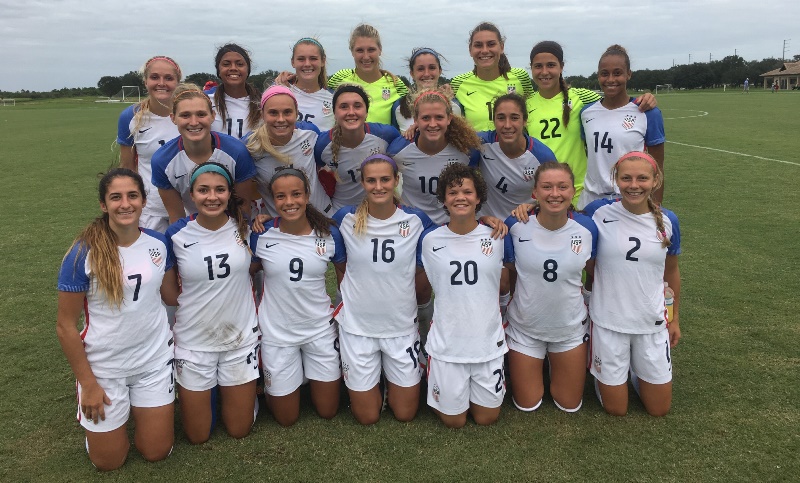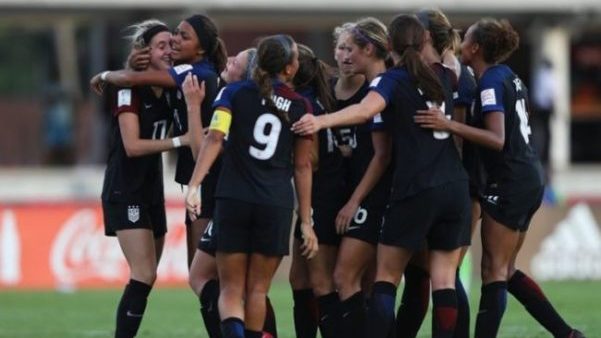Shawhan: US U-20 Women don’t deserve to be in World Cup semis

With a 2-1 victory over Mexico, the U.S. U-20 Women’s National Team are through to the World Cup semifinals, where they will face North Korea (DPR) Tuesday morning at 1 AM ET (broadcast live on FS1, NBC Universo). That’s one round further than the U.S. made it in the 2014 U-20 World Cup, when they were eliminated in the quarterfinals, also by Korea DPR.
Should you take this as a sign of progress?
Only if you didn’t actually watch the game against Mexico.
Make no bones about it: over the course of 90 minutes Mexico were the better, more creative, side. (Pause to let that sink in.) And while Mexico did not convert a couple of promising second-half chances, and left the door open for the late U.S. comeback, the U.S. was lucky to scrape through with a 93rd-minute winner. Even the official FIFA match report called this win “barely deserved.”
Of course, you might say that in the knockout rounds of a big tournament, the only thing that matters is advancing, which the U.S. did and Mexico didn’t. But at best, that’s incomplete. To figure out what advancing means — to get an accurate picture of the current U.S. U‑20 team, and its true level on the world stage — you have to look at performance, not merely results. And this performance was just plain bad.
Worse, it was bad in a way that we have seen before from this team under this coach.
Take the starting XI. Midfielder Katie Cousins, who had played alongside Emily Ogle in a double pivot of sorts against Ghana, was not fit to play against Mexico. But instead of replacing her with another midfielder, such as Marley Canales or Savannah DeMelo, coach Michelle French inserted Sabrina Flores, who is normally an outside back.
The best one could say for this move is that French may have wanted to make absolutely sure that the U.S. did not concede a goal, which would be embarrassing enough on its own terms. From the standpoint of actually playing soccer as if the U.S. were a top international side, it was a clear failure.
 Yes, the first-half possession numbers were about equal. But Mexico clearly carried the play to the U.S., which barely strung together any decent passing moves all half. Some of this was down to individual errors, unnecessary giveaways and the like. (Defenders Taylor Otto and Ellie Jean, in particular, had very difficult afternoons.)
Yes, the first-half possession numbers were about equal. But Mexico clearly carried the play to the U.S., which barely strung together any decent passing moves all half. Some of this was down to individual errors, unnecessary giveaways and the like. (Defenders Taylor Otto and Ellie Jean, in particular, had very difficult afternoons.)
The bigger problem, though, was the underlying gameplan. It was the same old story: the U.S. had little combination play, and absolutely nothing of note through the middle. Everything was down the wings. It was clear that this was the plan drawn up in advance — that the only attacking idea that the coaching staff could muster was trying to get Mallory Pugh or Ashley Sanchez or Emily Fox isolated 1v1 on a Mexican defender and just make something happen.
Even the goal kicks were a set play, calling for Casey Murphy to boot it long and wide right to try and get a flick-on from Jessie Scarpa for one of the fast U.S. attackers to run on to.
The side that actually connected passes in the center of the park, that looked like it had a coherent attacking plan for the whole team as a collective? That was Mexico.
The second half was perhaps a bit better for the U.S. Certainly they attacked more aggressively, if ineffectively. Of course, Mexico still scored the opening goal. And before and after the goal, the U.S. struggled to mount any decent possession or sustain attacking pressure. When substitute Ally Watt equalized in the 81st minute, it was the first U.S. shot on target in the match. That pretty much says it all right there.
Even after the equalizer swung the momentum to the U.S. in the closing stages, Mexico hardly crumbled. In fact, the sequence leading to Kelcie Hedge’s stoppage-time winner for the U.S. started with Pugh, of all people, having to break up a Mexican attack and recover the ball in the U.S. defensive third. Pugh and Elliston then combined to finally set Sanchez free down the wing, as Mexico simply didn’t have the legs to keep up. And when Sanchez, aided by a great dummy from Pugh, successfully cut it back to Hedge, her shot still required a fortuitous deflection off a Mexican defender.
 In U.S. Socccer’s post-match press release, French is quoted as saying “today it wasn’t about the soccer, it was about the heart and determination and the USA mentality.” That’s true. But the reason for that is the U.S., not for the first time, played terrible soccer — so heart and determination (and fitness) was fall they had left to fall back on. If you thought U.S. women’s teams had moved past that stage, as it stands right now you’d be wrong.
In U.S. Socccer’s post-match press release, French is quoted as saying “today it wasn’t about the soccer, it was about the heart and determination and the USA mentality.” That’s true. But the reason for that is the U.S., not for the first time, played terrible soccer — so heart and determination (and fitness) was fall they had left to fall back on. If you thought U.S. women’s teams had moved past that stage, as it stands right now you’d be wrong.
What is perhaps most exasperating (or dispiriting) about this whole mess is that it is unnecessary. It is not as though the U.S. is devoid of sophisticated players who can hold the ball and connect passes, so that French has been forced into playing this ugly retrograde excuse for a style of play. No. This gameplan was a choice on French’s part. And it’s a choice that she has made consistently for two World Cup cycles now. On the evidence of this World Cup and the last one, she won’t — or can’t — set up a team to play any other way.
So when you watch the remainder of this World Cup, and the way that the U.S. Soccer Federation handles the YNT program after the tournament, remember — the U.S. was not worthy of a place in the semifinals. Not even close.
SOCCERWIRE MARKETPLACE
- Wanted Licensed Youth Soccer Coach
- Join Official Elite Summer Soccer Camps with Europe’s Top Pro Clubs!
- The St. James FC Travel Staff Coach - North (Loudoun) & South (Fairfax)
- The St. James FC Girls Academy (GA) Head Coach - 2 teams
- The St James FC Boys Travel Tryouts
- OFFICIAL BAYERN MUNICH SUMMER CAMPS U.S.
- JOIN THE ALLIANCE!
- OFFICIAL FC BARCELONA CAMPS U.S.
- The Cup San Diego - Hosted by Legends FC
- Players Wanted - Undergraduate or Post-graduate











